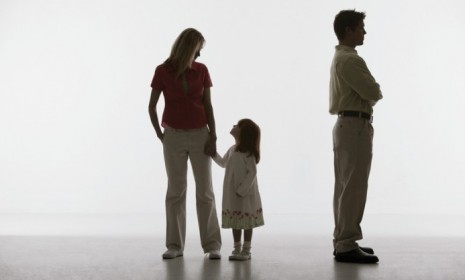Do daughters cause divorces?
Married couples raising girls are more likely to split up than those raising boys. What's the explanation?

A free daily email with the biggest news stories of the day – and the best features from TheWeek.com
You are now subscribed
Your newsletter sign-up was successful
Economists noticed in 2003 that married couples with daughters have a greater chance of getting divorced than those with sons. And among pregnant unmarried couples, those having boys are more likely to tie the knot. For years, researchers assumed boys made marriages last, but a new theory flips that around: What if daughters are better at breaking up bad marriages? Here's a guide to the puzzling daughter-divorce conundrum:
What are the numbers?
Eonomists Gordon Dahl (University of Rochester) and Enrico Moretti (UCLA) analyzed three million U.S. birth and marriage records, and found that married couples with one daughter are almost 5 percent more likely to split up, versus those with one son. And the effect grew more pronounced with more offspring: Parents of three girls are about 10 percent more likely to divorce than those with three boys. The numbers were even starker in other countries.
The Week
Escape your echo chamber. Get the facts behind the news, plus analysis from multiple perspectives.

Sign up for The Week's Free Newsletters
From our morning news briefing to a weekly Good News Newsletter, get the best of The Week delivered directly to your inbox.
From our morning news briefing to a weekly Good News Newsletter, get the best of The Week delivered directly to your inbox.
How did the researchers explain it?
The (male) economists focused on why boys might be an asset to marriages. Some of the theories, as laid out by Steven Landsburg in Slate: Men value sons more and are therefore more likely to stick around (or commit to sticking around) with a boy in the house; sons are more apt to fall apart emotionally when a father leaves, preventing him from doing so; or parents are held together by the belief that a boy needs a male role model in the house. "If you want to stay married," Landsburg concludes, "three of the most ominous words you'll ever hear are 'It's a girl.'"
Why are those theories flawed?
Keep in mind, says Notre Dame psychologist Anita E. Kelly in Psychology Today, 73 percent of divorces are instigated by the wife. So the question shouldn't be: "Why are fathers more likely to stick around for sons?" Rather, she says, we should ask: "Why are mothers of daughters divorcing more than mothers of sons?"
A free daily email with the biggest news stories of the day – and the best features from TheWeek.com
Does she offer any ideas?
Several, but they all boil down to: Mothers with daughters "don't need their husbands as much." She points to studies showing that sons "add to the daily workload of the parents," while daughters decrease it, and that females are better at offering social support than males. Add to these facts that daughters are more likely to stick around, Kelly says, and you can plausibly theorize that if a woman has a daughter, she knows she'll "never be lonely or without help," and is therefore more likely to exit a bad marriage.
Is that a new idea?
Not entirely. The Baltimore Sun's Susan Reimer points to an old proverb: "My son's my son till he hath got him a wife. But my daughter's my daughter all the days of her life."
Is either set of theories persuasive?
Looking at her husband, daughter, and son, Reimer says, Kelly's thesis "sounds about right to me." But Salon's Tracy Clark-Flory says that both sets of explanations are a little dehumanizing. "It's always disconcerting when researchers use percentages and averages to talk about complex human beings," she says. And while "these sorts of faceless generalizations about gender are ... useful to a certain point," they should be taken with "a grain of salt."
Sources: New York Times, Baltimore Sun, Salon, Psychology Today, Slate (2)
-
 ‘States that set ambitious climate targets are already feeling the tension’
‘States that set ambitious climate targets are already feeling the tension’Instant Opinion Opinion, comment and editorials of the day
-
 Mixing up mixology: The year ahead in cocktail and bar trends
Mixing up mixology: The year ahead in cocktail and bar trendsthe week recommends It’s hojicha vs. matcha, plus a whole lot more
-
 Labor secretary’s husband barred amid assault probe
Labor secretary’s husband barred amid assault probeSpeed Read Shawn DeRemer, the husband of Labor Secretary Lori Chavez-DeRemer, has been accused of sexual assault